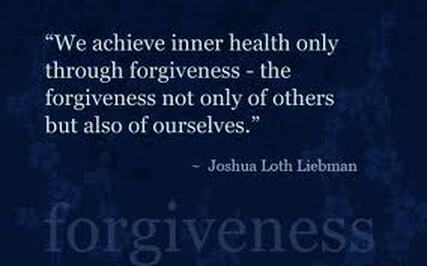Self-forgiveness is not about letting yourself off the hook. The act of forgiveness, whether you are forgiving yourself or someone who has wronged you, also does not mean that you are condoning the behavior. It means that you accept the behavior, you accept what has happened, and you are willing to move past it and move on with your life without ruminating over past events that cannot be changed.
Here are some key steps to move toward self-forgiveness:
- Face what you have done and admit your mistake. Discontinue making excuses, rationalizing, or justifying your actions in order to make them seem acceptable. Acknowledge and process your emotions. Give yourself permission to recognize and accept your feelings.
- Make amends, even with yourself. Forgiving yourself is more likely to stick when you feel like you've earned it. Apologize if it’s called for and look for ways that you can make it up to whomever you’ve hurt. Make an effort to right your wrongs. Seeking forgiveness and forgiving yourself go hand in hand. Ask for forgiveness, however, forgiving yourself should never be contingent on what the other person chooses, says or does.
- Forgiving yourself requires us to find a way to learn from the experience and grow as a person. To do this, you need to understand why you behaved the way you did. Reflect on the lessons learned and focus on the changes you’ve made to not repeat the scenario. Reminding yourself that you did the best you could with the tools and knowledge you had at the time.
- Acknowledge the mistake out loud and what you’ve learned from it. When you give voice to the thoughts in your head and the emotions in your heart, it helps to free yourself from some of the burden. It also helps to imprint in your mind what you learned from your actions and consequences.
- Hindsight bias…This is the feeling that you should’ve been able to predict, and therefore avoid, a negative outcome. It’s the tendency to view events as more predictable than they really are. People often recall their predictions before the event as much stronger than they actually were. Remember that hindsight is always 20/20. Forgive yourself for not knowing what you didn’t know before you learned it.
- Keep in mind that forgiveness is a process, not an event.
- Stop yourself anytime that you are ruminating or engaging in negative self-talk. Change your belief system about yourself. Work intentionally to let it go and surrender it. Once you make the choice to forgive yourself and you’re ready to not feel guilty, embarrassed, etc. than it’s about walking the walk.
Exercising self-compassion key throughout the forgiveness process. One way to do it is to have a conversation with your inner critic. Write out a “conversation” between you and your inner critic. This can help identify thought patterns that are sabotaging your ability to forgive yourself. On one side of a piece of paper write down what your inner critic says. On the other side of the paper, write a self-compassionate and rational response for each thing you wrote on the other side of the paper.
Any time you start to ruminate immediately stop yourself and reframe it and purposely think of something more constructive or positive. Say something like:
- I have forgiven myself and learned from my mistake.
- That’s the old story here’s the new story…
- That doesn’t apply to me anymore.
- Up until now…
- I’m learning and growing each day and I love and accept myself.
In other words, if I could let go of my resentments and judgments of myself, I could and should let go of my resentments and judgments of others and just plain move on, instead of staying stuck.

 RSS Feed
RSS Feed
